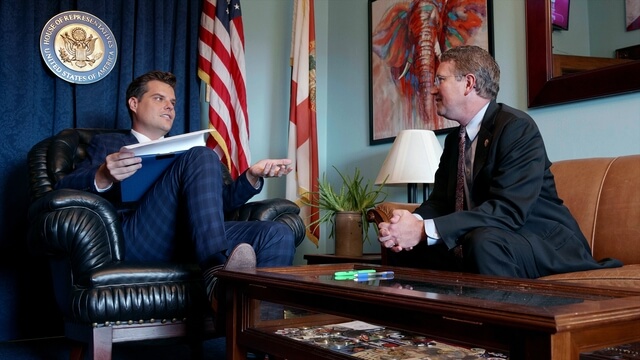To anyone with even a passing familiarity with the workings of Congress, there’s plenty of material in HBO’s new outrage-provoking documentary The Swamp that will feel awfully obvious. Yes, the process of fundraising has essentially created a system of legalized bribery; yes, special-interest groups and lobbyists wield an outsized influence that more or less dictates how congresspeople will vote, often against the interests of their constituents; yes, all of this is terribly harmful for democracy. The film effectively traces the birth of the modern all-fundraising-all-the-time elected official, but what it doesn’t do is offer anything in the way of new ideas. In fact, it’s pretty clear what needs to be done—and the film all too plainly points out why it’s not likely to happen.
What helps The Swamp rise above the status of another generic parade of talking heads and news footage that would work just as well as a magazine article are the slice-of-life moments that remind us that professional assholes like Gaetz are people, too; not only that, but there’s actually conflicted feelings going on inside these legislators’ heads when it comes to balancing the TV-ready soundbites and performative nonsense of their jobs with the realization that they’re not always in the right, no matter what they may say when the microphones are in their face.
It’s hardest to see with Gaetz, a truly loathsome Trump sycophant who does things like invite Holocaust deniers to the State of the Union and accuse Democrats of exactly the venal and corrupt behavior carried out by his favorite president. (There’s an especially embarrassing moment of boot-licking when Gaetz calls Trump after the revelation of the Ukraine scandal—the definition of impeachable conduct—just to reassure the president that he’s never done anything wrong. “You’re the best, Mr. President,” he says.) But he also earnestly attempts to remove the president’s post-2001 war powers authority, backs independent redistricting to eliminate gerrymandering, and wants to impose a lifetime ban on lawmakers becoming lobbyists after leaving office. There’s a fascinating if ultimately frustrating moment when he gets drinks with Katie Hill, the former progressive Democrat swept into office in a wave of anti-Trump fervor (and swept out thanks to a bullshit scandal based on an ex’s leak of revenge porn). Hill lays out the case for why Gaetz should’ve supported the Democrats’ anti-corruption bill, and you can see the wheels turning in Gaetz’s head as he realizes he might be on the wrong side of that fight. But then he says he loves Trump, and you can see the doubts and pragmatic arguments drain from his mind in favor of unblinking loyalty to his undeserving commander in chief.
Such moments help humanize people who make a career out of appearing to be one-note party hacks, and do as good as if not a better job of showcasing the deeper questions about party loyalty and reasonable disagreement than the moments when Gaetz and Massie work with their colleagues across the aisle to try and pass legislation weakening executive authority and pork-barrel spending. But where Gaetz has drunk deeply of the Trump Kool-Aid, Ken Buck sounds downright defeated in his estimation of maintaining any semblance of integrity in Congress. “I have no illusions that anybody cares what I have to say,” he says at one point. And Massie, who clearly supports most environmental legislation and has a home completely fueled by clean energy, quietly pretends the science on coal pollution is unproven—which the documentary points out may have something to do with the Koch brothers’ promise in 2012 to unseat any Republican who dares acknowledge the reality of climate change.
But the documentary’s most useful tactic is how it demonstrates the ways that hyper-partisanship, and hateful rhetoric on both sides, is actually serving the corrupt status quo far more effectively than any outright bribery ever could. Indeed, it’s one of the great tragedies of the film that Gaetz and the others, time and again, are confronted with the evidence that their dangerous and demonizing talk hurts the very cause of integrity and anti-corruption he’s trying to champion, only to brush it off with an optimistic if foolhardy belief you can be “bipartisan and hyper-partisan” at the same time. The irony of Gaetz, after another mass shooting, bemoaning the “hate-filled mentality we have to get to the bottom of,” only to turn around and accuse Democrats of trying to stage a coup because they hate America, would seemingly be lost on the young representative.
The Swamp is even-handed in the treatment of its subjects—their hypocrisy would be impossible to ignore, but the filmmakers don’t rub their noses in it—meaning it will probably irritate both progressives and conservatives looking for the simple reassurance of confirmation bias. But there’s a simple earnestness to its despair over fixing Washington corruption, a useful reminder that, actually, sometimes there are easy answers—if only the path to achieve them wasn’t so effectively blocked by moneyed interests. Eat the rich, indeed.


 Keep scrolling for more great stories.
Keep scrolling for more great stories.